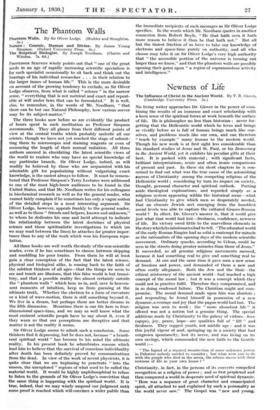The Phantom Walls
PROFESSOR SniFSON wisely points out that "one of the great aeeds in an age of rapidly increasing scientific specialism is for each specialist occasionally to sit back and think out the bearings of his individual researches . . . in their relation to the larger issues of human life." This is the more desirable on account of the growing tendency to exclude, as Sir Oliver Lodge observes, from what is called " science " in the narrow sense, " everything that is not metrical and exact and repeat- able at will under laws that can be formulated." It is well, also, to remember, in the words of Mr. Needham, "that there can be but one Natural Philosophy, how various soever may be its subject-matter."
The three books now before us are evidently the product of hours spent in such meditation as Professor Simpson recommends. They all glance from their different points of view at the central truths which probably underlie all our science, though we have not yet reached the stage of submit- ting them to microscopes and staining reagents or even of measuring the length of their normal radiation. All three authors succeed in elucidating the latest scientific views of the world to readers who may have no special knowledge of any particular branch. Sir Oliver Lodge, indeed, as will readily be believed by those who are acquainted with his admirable gift for popularizing without vulgarizing exact knowledge, is the easiest always to follow. It must be remem- bered that Professor Simpson's Terry Lectures were addressed to one of the most high-brow audiences to be found in the United States, and that Mr. Needham writes for his colleagues in biochemical research as well as for the general reader, who cannot fairly complain if he sometimes has only a vague notion of the detailed steps in a most interesting argument. Sir Oliver Lodge, however, appeals frankly to the general reader, as well as to those" friends and helpers, known and unknown," to whom he dedicates his sane and lucid attempt to indicate the relationship between the latest doctrines of physical science and those spiritualistic investigations to which (as we may read between the lines) he attaches far greater impor- tance than to any of the work which won his European repu- tation.
All three books are well worth the study of the non-scientific reader, even if he has sometimes to choose between skipping and muddling his poor brains. From them he will at least gain a clear conception of the fact that the latest science, physical and biological alike, is coming back to the faith of the subtlest thinkers of all ages—that the things we seem to see and touch are illusions, that this false world is but transi- tory, and that a possible reality lies almost certainly outside the "phantom walls" which hem us in, and, save in heaven- sent moments of intuition, keep us from guessing at the ultimate truth, Whether the electron be a form of curvature or a kind of wave-motion, there is still something beyond it. We live in a dream, but perhaps there are better dreams in the fifth dimension. Meantime there is our life here in four- dimensional space-time, and we may as well know what the most eminent scientific people have to say about it, even if they warn us that our perceptions are deceptive and that matter is not the reality it seems.
Sir Oliver Lodge seems to admit such a conclusion. Some thinkers find it depressing, but he does not, because " a benefi- cent spiritual world" has become to his mind the ultimate reality. In his present book he adumbrates reasons which lead him to believe that the survival of conscious individuality after death has been definitely proved -by communications from the dead. In view of the work of recent physicists, it is quite clear that we are beginning to penetrate "into the unseen, the unexplored" regions of what used to be called the material world. It would be highly unphiksophical to refuse to listen to the grounds of Sir Oliver Lodge's conviction that the same thing is happening with the spiritual world. It is true, indeed, that we may wisely suspend our judgment until some proof is reached which will convince a wider public than
the immediate recipients of such messages as Sir Oliver Lodge specifies. In the words which Mr. Needham quotes in another connexion from Robert Boyle, "He that hath seen it hath more reason to believe it than he that hath not." But all but the tiniest fraction of us have to take our knowledge of electrons and space-time purely on authority, and all who choose may take it on Sir Oliver Lodge's very high authority that " the accessible portion of the universe is turning out larger than we knew," and that the phantom walls are possibly opening their gates upon "a region of supramundane activity and intelligence."










































 Previous page
Previous page